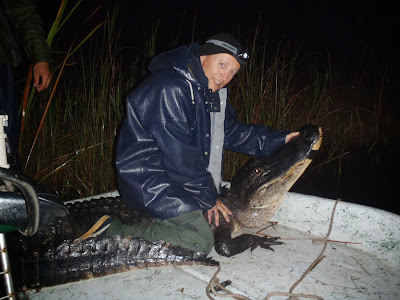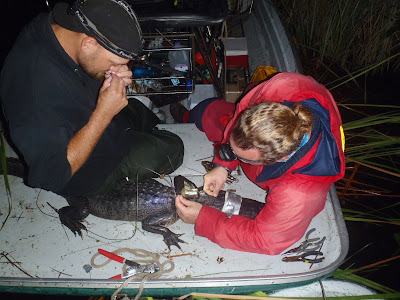Hi all,
As this is my second post, I probably shouId introduce myself! I'm Adam Barnett the
Director and lead scientist at OceansIQ, and I am currently a long way from my home in Cairns.
Collaboration is essential for marine biologists. It combines resources, skill sets and data from similar projects in different locations to strengthen the science and create a broader perspective for the topic at hand. It also means that we can answer questions faster and more efficiently - very important in a world with limited funding.
To begin my collaboration journey this month, I visited Mike Heithaus Lab at Florida International University in Miami, USA. I first met when he marked my PhD on sevengill sharks a few years ago, and we have stayed in contact. Mike and his team are conducting some great research in Australia's own backyard, Shark Bay, in Western Australia, as well as other sites such as the Florida Everglades. I visited Mike to work on a joint grant application and discuss future collaborative projects. Of course, while I was there I took the opportunity to get out in the Everglades with some of Mike's team and another team from University of Florida to attach satellite tags to alligators, just one of the projects his lab are involved in.
 |
| Me restraining a freshly caught 'gator, in the Florida Everglades |
While we use satellite tags for sharks, they can be used for many different animals that are big enough to carry them. Satellite tags
send a signal to satellites so that the GPS location of the animal can be
recorded and their movement patterns and habitat use studied.
Visiting the
Everglades and catching alligators were both exciting new experiences for me.
The field work began as the sun went down and continued all night with us
arriving back at the University just before sun rise. The team managed to catch
7 alligators and deploy the 6 satellite tags they needed to. A big thank you
to the guys at University of Florida for taking me out in the field with them for
the night.
 |
| Kirk Gastrich from the Heithaus lab at FIU and Jeff Beuchamp from University of Florida fitting one of 6 satellite tags to an Everglades 'Gator. |
Also on my collaboration trail was Mahmood Shivji, Director of the Guy Harvey Research Institute at the Nova Southeastern University
Oceanographic Center. Mahmood’s lab
are running a number of great research projects with a focus on genetics and
satellite tracking. I highly recommend checking out their website showing the movement paths of the animals
they have tracked.
Mahmood's lab and OceansIQ are collaborating with South African and Mozambican
scientists to satellite tag tiger sharks in Mozambique in January 2014 (see below).
I also took the opportunity to meet Neil Hammerschlag, Director of R. J. Dunlap Marine Conservation Program at the University of Miami. Check out his lab's great website to
see the research and education programs they are running.
Ok, I’m off to Cape Town next week to continue the South African sevengill shark project with OIQ collaborator Alison Kock from Shark Spotters. We're hoping to tag 12 sevengills with acoustic tags, as well as collect blood and tissue samples for hormone analysis and stable isotopes to look at their reproductive status and diet.
Then I'm off to Mozambique to begin that new project I was telling you about earlier on Tiger Sharks. I'll be working with Malcolm Smale and Mahmood Shivji, we are aiming to catch 7 Tiger Sharks to fit with satellite and acoustic tags this trip.
I'll be keeping you up to date with how the field work is going, but if anyone has any questions about these projects, I'm happy to answer, just use the comments below.
Then I'm off to Mozambique to begin that new project I was telling you about earlier on Tiger Sharks. I'll be working with Malcolm Smale and Mahmood Shivji, we are aiming to catch 7 Tiger Sharks to fit with satellite and acoustic tags this trip.
I'll be keeping you up to date with how the field work is going, but if anyone has any questions about these projects, I'm happy to answer, just use the comments below.
Cheers

No comments:
Post a Comment